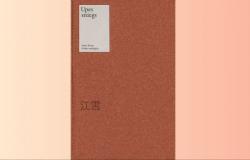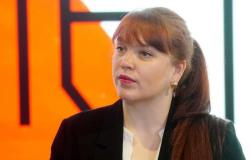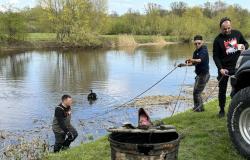
“At the center of Imanta’s personality is humanity,” his spouse, President Vaira Vīke-Freiberga, is quoted on the spine of the book. “Sometimes it seems to me that he looks at everything even too positively. However, seeing the good in everything is part of his personality.
He is quiet and unassuming, and he is not familiar with boasting. Besides, the fact that one person can be so free from evil impressed me a lot when I was young.”
In the book, you will learn how young Imants Freiberg, a refugee from World War II, earned his parents tickets to Canada, and why exactly he may have invented hand-opening metal bottle caps.
A conversation with Imant Freiberg
Our meeting in Freiberg’s Riga apartment starts with a little banter. Opening the outer door is used by Muris. The three-year-old tomboy, which was just brought from the countryside in Ivande in a cage, breaks free. We go to look for Muri – Mr. Freiberg with the elevator, stopping at each floor, me – down the stairs on foot. Between the 1st and 2nd floor, the refugee voluntarily goes to the hands.
Even though a neighbor could accidentally let Muri out on the central street of Riga, the cat’s owner perceives the situation without the slightest panic. Peace and composure even at the age of 90! Imants Freibergs, a retired professor of computer science, just celebrated such a round anniversary.
In every word, you can feel that the entertainer really does not seek attention, but also takes our conversation business-like: “Do what needs to be done!”
Ieva Puķe: You have produced many different scientific publications, but this one is completely different – have you ever written a diary or any notes?
Imants Freiberg: Juris Visockis from “Jumavas” told me one day to write a memoir. I hadn’t thought about it, I refused from the beginning. But he said he would give me help, he gave one journalist.
I had lived in Canada for many years and was, as they say, an exile in several countries. I made such a list of associates… Starting with the very first one, who was still alive when I came to Latvia – Irēna Paegle, later Kalniņa after marriage.
A classmate?
A classmate. We started the second grade together at Jelgava model elementary school.
In the book, you tactfully name many people – from your classmate to people you met when you entered Canada. Your kids are talking too, your lady is talking. Perhaps even half of the book is named after other people. For example, you wrote about Ms. Irene: “She remembers the bombing of Jelgava better than I do.”
Yes it is so. I wanted colleagues to tell me more than I know myself. I didn’t want to create a kind of calendar – to describe life day by day.
The book contains an episode from your life in Canada – you gave your son Karl a name there. He was four years old, you were sitting in the plane, and he asked if God is – is it also in the engine, also in the plane? He considers in the book that it was one of the most important conversations in his life. What made you believe that God exists, a person with an exact education?
I somehow believed that if it says that God exists, then God really exists.
Maybe there were also some events in life…?
I didn’t think much of it, but assumed that I was being accompanied by angels.
We came to France, and I did manual labor in the countryside, on a farm, for one year. I know everything, I could be a farmer!
From this book alone, we learn that you were very successful in your studies and career. Maybe people have the idea that you always stand behind the president. Great art – to let the other person shine!
When Vaira and I got married in 1960, we had decided that we would be each other’s companions. I started working at “IBM”. Its leader, Watson, had built a computer as big as a room. When he was asked how many more such he would build, he said – about five, six.
And that’s it, will computer construction end?
Yes, about that. I later moved to an academic position at a university in Montreal, where Vaira was studying for a Ph.D.
Book launch event
Photo: Ieva Puķe / Latvian Radio
You have included very personal episodes in the book, for example, about the death of your second son. Did you have family discussions about whether or not you should?
At least I thought that life is what it is – it should be told. Otherwise, it may not be clear why this or that is being done.
We also worked together with Vaira, studying songs, she had learned Latvian folklore well, which in turn was useful for her when writing speeches. It turned out that she is a very good speaker. He knows how to speak in a large group of people so that everyone starts listening to him. Don’t tell clichés. There we also had the same thinking.
One hears that in America, for example, the husband is a Republican and the wife is a Democrat. We didn’t have that, we did common things. I was a professor of information technology (IT) and she was a professor of psychology, but she was also the president of the Canadian Psychological Association. I was not surprised – if she starts working at the Institute of Latvia, then she will also be the president of Latvia.
You describe Vaira’s presidency quite a bit in the book and you also give her a name. Does that mean she won’t write her book about it?
She will definitely write her book too, she has already started it. From childhood itself, because it is such a thing that no one knows.
The story of her Canadian life has yet to be written, she has made it all the way to Germany. We have parallel lives – while I was in France, she was in Morocco. We met in Canada.
There was no such division: you will not put this in your book, let’s leave it for her book?
No, we didn’t think so. I have been writing for several years, with breaks in between.
The eight years of Vair’s presidency are a separate stage in my life. I started working in the IT field in Latvia, trying to get as many users as possible. At that time, the Internet began to develop, but now everyone can communicate with the whole world on the phone.
How did you decide to end the book? Was it decided that the book should come out for the anniversary you just celebrated?
It just happens to coincide with the anniversary. The basis is childhood, then exile, and then back to the homeland, Latvia.
Do you still want to continue researching songs?
To some extent. I recently published a book where I collected all the songs about Lyme – “Lyme’s life story” – now I could study which color is used the most in songs. We can find out by looking at the index I made of the songs of the sun.
Have you been a happy person?
Yes. There are pros and cons, uphill and downhill. I don’t think there is any person who has been only happy or unhappy. Maybe the “happy” ones just don’t tell everything…
With 90 years of life experience, do you have any advice for people – what should not be forgotten, so as not to regret it later?
I called my book “Do What Must Be Done”. Those works already arise by themselves, and then they must be done. I was good with computers, I could mainly do something in the IT field. For example, I was the president of the Latvian Information Technology Association.
The work itself is what tells you what to do next?
Yes, while doing the work, ideas arise for what to do next.
Tags: happy simply dont conversation Imantas Freiberg book Article
-




